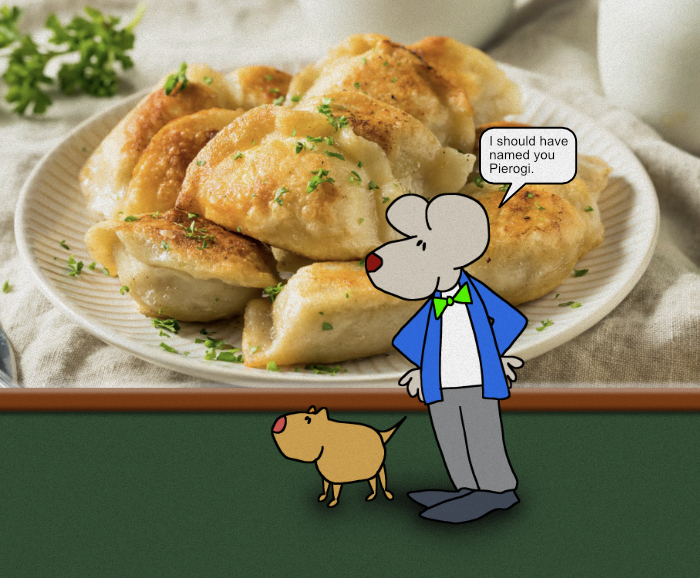I’ve had a pierogi or two. I’ll tell you that right now.
When I was a kid, a Lithuanian family lived right up the street. One of the girls was a year younger than me, and we used to hang out quite a bit back in the East Bruce Avenue days.
One thing I loved about going to their house was the food. They always had these Lithuanian dishes that were out of this world. Like this potato-bacon dish called Kugelis. They also made potato dumplings and potato pancakes. And they always had sausages.
But sometimes, they’d take me over to the north side of Dayton to their club. It was over on Valley Street, I think. It might have even been a Polish Club. Anyway, they’d have parties over there, and the food was for days. I felt like a happy little pig in the midst of a royal Lithuanian smorgasbord.
It might have been there that I ate my first pierogi.
Here’s what Noah says:
pierogi | pəˈrōɡē, pirˈōɡē | (also perogi or pirogi)
noun (plural same or pierogies)
a small dough dumpling stuffed with a filling such as potato or cheese, typically served as a dish with onions or sour cream.
ORIGIN
via Polish pieróg or Ukrainian pyrih from Russian pirog.
Here’s what I say:
Heavenly dough dumplings
But every time I hear the word pierogi, I think of prerogative.
Even though they sound a bit similar, the are unrelated in origin.
Webster:
prerogative | p(r)əˈräɡədiv |
noun
•a right or privilege exclusive to a particular individual or class.
ORIGIN
late Middle English: via Old French from Latin praerogativa ‘(the verdict of) the political division which was chosen to vote first in the assembly’, feminine (used as noun) of praerogativus ‘asked first’, from prae ‘before’ + rogare ‘ask’
Here is the thing about prerogative. All these years I thought the meaning was “choice.”
Like I’d say, “It’s my prerogative to ride my bike instead of my skateboard.” I thought it meant it was my choice to ride my bike. But I’ve been using it wrong all these years. Because I sure didn’t mean it was my right or privilege to arrive on my banana-seat bike.
It always surprises me when I learn I’ve been using a word in the wrong way after half a century. Or that I’m not doing something effectively. Like prerogative. Heck. I’ve even been spelling it wrong.
That is the thing about us humans. We started out knowing nothing. Nothing at all. But little by little, we begin to amass information. We collect it bit by bit, stashing it here and there. And if we are lucky, we continue this manner of behavior for all our lives. Who said you can’t teach an old dog new tricks? Sure you can, if the dog is willing. Also to note? Our knowledge is only as good as its source.
Back to the pierogi. I certainly know what they are. I’ve never made a pierogi, but I bet I could learn if I wanted to. And I also found out today that there is a patron saint of pierogis — Saint Hyacinth.
There is an old Polish saying “Święty Jacku z pierogami!” (“Saint Hyacinth and his pierogi!”). This translates to a call for help in the midst of hopeless circumstances.
It is believed that on July 13th, 1238, in the town of Kościelec, a hailstorm broke out during his visit. The terrible hail destroyed all of the crops. Hyacinth told the people to pray. So they did. And the following day, the crops were miraculously restored. The people thanked Hyacinth by making him loads and loads of pierogis from the crops.
And, I’m not the only one around here who loves a pierogi. I live in an area of the United States known as the “Pierogi Pocket.” Two-thirds of the yearly pierogi consumption (in the United States) is in an area that includes New York, New Jersey, Pennsylvania, Ohio, Indiana, Chicago, and Detroit. My good, adopted town of Pittsburgh holds a pierogi festival every year.
I don’t know why I chose to write about pierogis. But thankfully, it is my prerogative to do so. And for that, I am perfectly perky. Purring even.
=====
“Know what you want, work to get it, then value it once you have it.”
― Nora Roberts
=====
“When you have to make a choice and don’t make it, that is in itself a choice.”
— William James
=====
“With awareness come responsibility and choice.”
— Amanda Lindhout
======
Those good pierogis. It’s my prerogative. Or is it?
